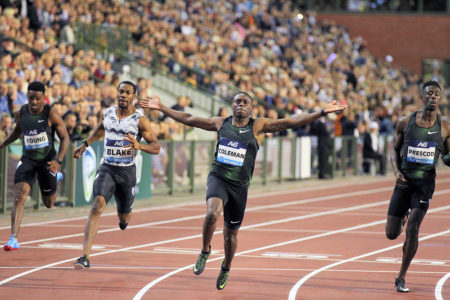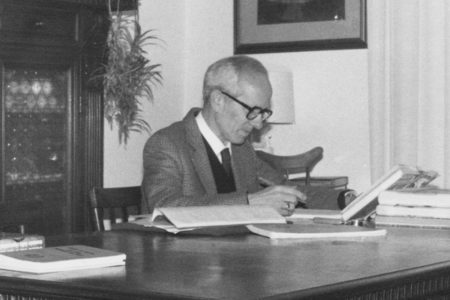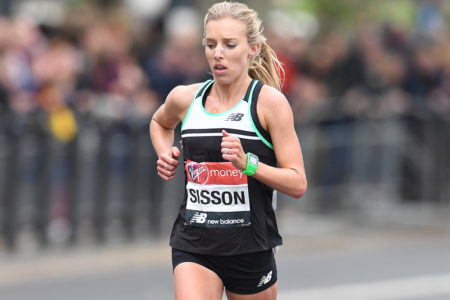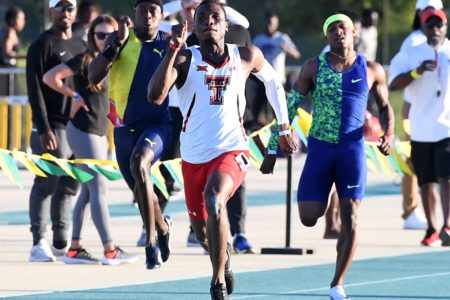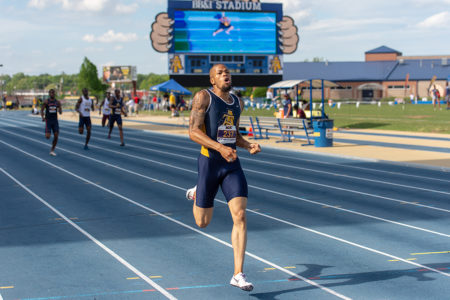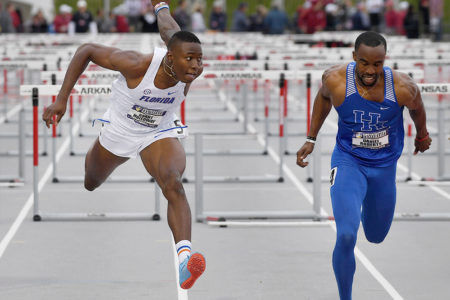
YOKOHAMA, JAPAN, May 10-11—After three editions of the meet in the Caribbean, the IAAF’s World Relays moved to Asia and, like its predecessors, the meet was marked by innovation and enthusiasm. In this case, it also had some pre-meet drama, beginning with the decision by the Bahamas not to continue hosting the Relays, as it had since the meet’s inception in ’14. Eventually, Japan stepped up to the plate, but the decision to hold the meet in Yokohama was not announced until last October, giving the locals less than 8 months to organize things.
There was also some drama relating to which teams and which athletes would actually show up. In the week before the meet, it appeared that two major African countries would have to withdraw. Botswana canceled after its federation failed to obtain the expected funding. Just days before the meet, Nigeria announced that it was having visa problems. The problems were eventually resolved—the team left two days late, but they did get there and ran. There were other issues involving individual athletes. In addition to the normal withdrawals due to injury, one high-profile performer, Jamaica’s Yohan Blake, had a public disagreement with his federation on which event(s) he would run and so he didn’t run at all.
Those who did compete found a stadium atmosphere that was unlike what had been experienced in the Bahamas. The attendance (15,083 on Saturday and 20,134 on Sunday) was actually greater than it had ever been, but here the spectators were confined to the lower deck of a 72,000-seat soccer stadium, whereas the 15,000-seat track stadium in Nassau was almost full—a different look and feel. The Yokohama crowd, however, was quite enthusiastic in its support of the Japanese athletes, who ran competitively in almost every race. In fact, Japan ended up 3rd in the team point standings behind the U.S. and Jamaica, which have now finished 1-2 in all four editions of the meet.
The meet has always been a showcase for innovation, and Yokohama 2019 was no exception. For the first time the meet had no races with any leg longer than a 400. In addition, there were two entirely new events on the program, a mixed shuttle hurdle relay and a mixed “2x2x4” in which each team was composed of one man and one woman, who alternated running laps. These were in addition to the mixed 4×4, which made its debut in ’17.
The mixed 4×4 will be part of the World Championships for the first time this year and 12 of the 16 available spots in the Worlds are reserved for the top finishers at the World Relays (the remaining 4 will be performances during the qualification period.) In the other WC relays, 10 places are based on performances at the World Relays. Not surprisingly, there were far more teams entered in those events than in the events that will not be held in Doha.
The U.S. entered all 9 events, and after the first day—when it won both finals—it looked as if Team USA could win them all. They encountered a series of mishaps and sub-par performances on Sunday, but still ended up with 5 victories. The events:
Men’s 4 x 100: Brazil 38.05 (WL)
Great Britain ran a world leading 38.11 in the first heat here. The Americans—going for a third straight win—took the second in a U.S.-leading 38.34 and improved that to 38.07 in the final. But that was not quite good enough. After a good lead leg from Mike Rodgers and a strong backstretch run from Justin Gatlin, a less-than-perfect exchange between Gatlin and Isiah Young left them chasing the leaders. Noah Lyles ran an excellent anchor, but could not overtake Brazil, which improved the WL to 38.05.
1. Brazil 38.05 (WL) (Rodrigo Do Nascimento, Jorge Vides, Derick Silva, Paulo De Oliveira); 2. United States 38.07 (AL) (Mike Rodgers, Justin Gatlin, Isiah Young, Noah Lyles);
3. Great Britain 38.15 (CJ Ujah, Harry Aikines-Aryeetey, Adam Gemili, Nethaneel Mitchell-Blake); 4. China 38.16; 5. France 38.31; 6. Jamaica 38.88; 7. Turkey 39.13; … dnf—Italy.
Heats: I–1. Great Britain 38.11 (WL). III–1. United States 38.34 (AL) (Rodgers, Gatlin, Young, Cameron Burrell).
Men’s 4 x 200: USA 1:20.12
The U.S. team of Christopher Belcher, Bryce Robinson, Vernon Norwood and Remontay McClain ran a world-leading 1:19.73 in the heat, and then won the final in 1:20.12. South Africa’s Akani Simbine closed well, but couldn’t quite catch McClain, and his team had to be satisfied with an African Record 1:20.12. Jamaica, which had won 2 of the last 3, sent a weak team that was 5th in its heat and ended up being DQed for a passing zone violation. Canada, which had won in ’17, did not enter. Said Belcher, It feels great. It’s still the beginning of the season. We’re not too upset about losing the 4x400m. Our job is to try to win everything; sometimes it comes up short.”
1. United States 1:20.12 (Christopher Belcher, Bryce Robinson, Vernon Norwood, Remontay McClain); 2. South Africa 1:20.42 NR (#4 nation) (Simon Magakwe, Chederick Van Wyk, Sinesipho Dambile, Akani Simbine); 3. Germany 1:21.26 NR (Maurice Huke, Patrick Domogala, Aleixo-Platini Menga, Robin Erewa); 4. Kenya 1:22.58; 5. Japan 1:22.67; 6. China 1:22.81;… dq—Bahamas & Nigeria.
Heats: I–1. United States 1:19.73 (WL, AL) (9A). II–1. South Africa 1:20.64 NR (#5 nation).

Men’s 4 x 400: Trinidad 3:00.81 (WL)
The Americans had won all three previous 4x4s, and they seemed well on their way to keeping their perfect record. They led every step of the way in the final, with strong legs from Nathan Strother, Fred Kerley and Michael Cherry. Paul Dedewo expanded the U.S. lead on the backstretch, but then paid the price for his blistering pace. Still well in the lead after the final turn, he faltered badly in the homestretch and fell at the line after having been overtaken in the final step by Trinidad’s Machel Cedenio, whose sparkling 44.4 gave his team a world-leading 3:00.81. The U.S. was timed in 3:00.84, which would have been an American-leading time, but was DQed for a lane violation, apparently on the first leg.
1. Trinidad 3:00.81 (WL) (Deon Lendore 45.9, Jereem Richards 44.8, Asa Guevara 45.7, Machel Cedenio 44.4);
2. Jamaica 3:01.57 (Demish Gaye 45.9, Akeem Bloomfield 44.9, Rusheen McDonald 45.3, Nathon Allen 45.5); 3. Belgium 3:02.70 (Dylan Borlée 46.6, Robin Vanderbemden 46.2, Jonathan Borlée 44.8, Jonathan Sacoor 45.1); 4. Japan 3:03.24; 5. Great Britain 3:04.96; 6. South Africa 3:05.32; 7. Australia 3:05.59);… dq[3:00.84]—[2]United States (Nathan Strother 45.7, Fred Kerley 44.4, Michael Cherry 45.1, Paul Dedewo 45.6).
Women’s 4 x 100: USA 43.27
The U.S. won this race at the first World Relays but were outrun by a loaded Jamaica team in ’15 and never finished the race in ’17 after lead leg Tianna Bartoletta slipped and fell. There were no such mishaps in Yokohama as the foursome of Mikiah Brisco, Ashley Henderson, Dezerea Bryant and Aleia Hobbs ran a world-leading 42.51 in its heat, and then won the final in 43.27, the slower time undoubtedly resulting from the cooler, windier conditions on Sunday. Jamaican anchor Jonielle Smith closed fast and made up ground on Hobbs, but ended up 0.02 behind.
1. United States 43.27 (Mikiah Brisco, Ashley Henderson, Dezerea Bryant, Aleia Hobbs); 2. Jamaica 43.29 (Gayon Evans, Natasha Morrison, Shashalee Forbes, Jonielle Smith); 3. Germany 43.68 (Lisa Marie Kwayie, Alexandra Burghardt, Gina Lückenkemper, Rebekka Haase); 4. Brazil 43.75; 5. Italy 44.29; 6. Australia 44.62; 7. Ghana 44.77; 8. Denmark 45.32.
Heats: I–1. United States 42.51 (WL, AL).
Women’s 4 x 200: France 1:32.16
With only 9 teams entered, the race ran as a straight final. Jamaica sent a strong team that included Olympic champion Elaine Thompson and former World Champion Shelly-Ann Fraser Pryce. The U.S. had a good quartet as well, but both teams were undermined by bad passing. The Americans’ first exchange from Kyra Jefferson to Shania Collins was not very good. The Jamaican pass from Thomson to Stephanie-Ann McPherson was much worse, and they were never in contention after that. The final U.S. exchange from Gabby Thomas to Jenna Prandini was faulty as well. Prandini ran well in the homestretch to finish behind France and China, but the U.S. team was DQed for passing out of the zone, which moved Jamaica up to 3rd. France’s 1:32:16 was the slowest winning time ever.
1. France 1:32.16 (Carolle Zahi, Estelle Raffai, Cynthia Leduc, Maroussia Paré); 2. China 1:32.76 (Xiaojing Liang, Yongli Wei, Lingwei Kong, Manqi Ge); 3. Jamaica 1:33.21 (Elaine Thompson, Stephenie Ann McPherson, Shelly-Ann Fraser-Pryce, Shericka Jackson); 4. Japan 1:34.57; 5. Germany 1:34.92; 6. Ecuador 1:35.91; 7. Papua New Guinea 1:43.85;… dq—United States (Kyra Jefferson, Shania Collins, Gabby Thomas, Jenna Prandini);
… dnf—Kenya.
Women’s 4 x 400: Poland 3:29.47
Like the U.S. men, the American women had won all prior editions, but like the men their attempt at a four-peat was thwarted. Jade Stepter ran a 52.5 first leg for the U.S. and at the handoff, they were among three teams almost even. Shakima Wimbley’s 50.8 second leg opened up a clear lead, which Jessica Beard held until fading badly just before passing to anchor Courtney Okolo. Beard’s split of 53.3 left Okolo in 4th coming out of the exchange. For most of the final lap, Poland and Jamaica battled for the lead, with Poland taking over midway down the homestraight. Okolo ran a 51.0, fastest of the anchors, and that was good enough to overtake Italy and Jamaica. But in the end, Poland, which had won last year’s World Indoor and European Outdoor titles, added the World Relays victory to its laurels. The winning time was an unremarkable 3:27.49, more than 8 seconds above the meet record. The U.S. had claimed the yearly world lead with a 3:25.72 in the heats.
1. Poland 3:27.49 (Małgorzata Hołub-Kowalik 52.6, Patrycja Wyciszkiewicz 51.1, Anna Kiełbasińska 52.1, Justyna Święty-Ersetic 51.7); 2. United States 3:27.65 (Jaide Stepter 52.5, Shakima Wimbley 50.8, Jessica Beard 53.3, Courtney Okolo 51.1); 3. Italy 3:27.74 (Mariabenedicta Chigbolu 52.9, Ayomide Folorunso 51.3, Giancarla Trevisan 52.1, Raphaela Lukudo 51.4); 4. Canada 3:28.21 (Sage Watson 51.6); 5. Jamaica 3:28.30 (Janieve Russell 52.0); 6. Great Britain 3:28.96; 7. Switzerland 3:32.32; 8. France 3:36.28.
Heats: II–1. United States 3:25.72 (WL, AL) (Stepter 51.6, Jordan Lavender 51.5, Joanna Atkins 51.4, Okolo 51.2).

Mixed 4 x 400: USA 3:16.43
Unlike Team USA’s single-sex 4x4s, the mixed team had no problems. They could have run in any order but, like every other team in the final, decided to run men on the first and fourth legs, with the women in the middle. My’lik Kerley put the U.S. a step in front with his leadoff leg of 46.3 before Joanna Adkins (51.6) and Jasmine Blocker (52.3) extended that lead and then Dontavious Wright clinched things with his 46.2, the fastest anchor. The U.S. was followed by Canada and Kenya. The winning time of 3:16.43 was 2.01 slower than what the Bahamas ran in ’17, when this event was introduced.
1. United States 3:16.43 (My’lik Kerley 46.3, Joanna Atkins 51.6, Jasmine Blocker 52.3, Dontavius Wright 46.2); 2. Canada 3:18.15 (Austin Cole 46.7, Aiyanna Stiverne 52.4, Zoe Sherar 52.7, Philip Osei 46.4); 3. Kenya 3:19.43 (Jared Momanyi 46.8, Maureen Thomas 54.0, Hellen Syombua 52.0, Aron Koech 46.6); 4. Italy 3:20.28; 5. Poland 3:20.65; 6. Brazil 3:20.71; 7. Germany 3:22.26; 8. Belgium 3:25.74.
Mixed 2 x 2 x 400: USA
In this new event, which featured a man and woman each running a pair of 400 legs, the U.S. chose to lead with its woman (Ce’aira Brown), with Donavan Brazier handling the second and fourth stints. Kenyan leadoff Collins Kipruto took a commanding lead with his 49.1, while Brown led the women’s pack in 56.3. Brazier closed the gap to 0.40 with his 50.8, but Kenya still led after 2 laps and of course opened up a big lead again with Kipruto coming back to run the third leg against the women. Brown ran 61.0 to put the U.S. in 3rd at the final exchange, and then Brazier ran 48.8, by far the fastest anchor. He took the lead going into the home straight and was never headed. Australia and Japan took 2nd and 3rd ahead of Kenya, which faded to 4th and was subsequently disqualified for having stepped inside the track. The winning time was 3:36.92.
1. United States 3:36.92 (Ce’Aira Brown 56.3, Donavan Brazier 50.8, Brown 61.0, Brazier 48.8); 2. Australia 3:37.61 (Catriona Bisset 57.1, Joshua Ralph 50.8, Bisset 59.4, Ralph 50.3); 3. Japan 3:38.36 (Ayano Shiomi 57.3, Allon Tatsunami Clay 50.6, Shiomi 60.4, Clay 50.1); 4. Poland 3:42.14; 5. Belarus 3:51.64; 6. Papua New Guinea 4:04.73; 7. Athlete Refugee Team 4:08.80; … dq—Kenya (Collins Kipruto 49.1, Eglay Nalyanya 57.6, Kipruto 53.6).
Mixed Shuttle Hurdles: USA 54.96
The shuttle hurdles is a familiar race at American relay meets, but it’s almost unheard of elsewhere. Even in the U.S. a mixed race, with the men running 110m and the women 100m with the appropriate heights for each, is a novelty. Despite the inexperience of all concerned, the event was well administered and was well received by the crowd. Based on their traditional strength and depth, the U.S. and Jamaica were the logical favorites, and led the qualifiers. But injuries forced Jamaica to scratch from the final, and when Australia was DQed for a false start, the race ended up a 2-team affair. Japan actually led after the first two legs, but U.S. indoor champion Sharika Nelvis and indoor/outdoor champ Devon Allen dominated the last two legs, giving the Americans a decisive win in 54.96.
1. United States 54.96 (Christina Clemons, Freddie Crittenden, Sharika Nelvis, Devon Allen); 2. Japan 55.59 (Ayako Kimura, Shunya Takayama, Masumi Aoki, Taio Kanai);… fs—Australia (Brianna Beahan, Nicholas Hough, Celeste Mucci, Nick Andrews);… dnc—Jamaica.
